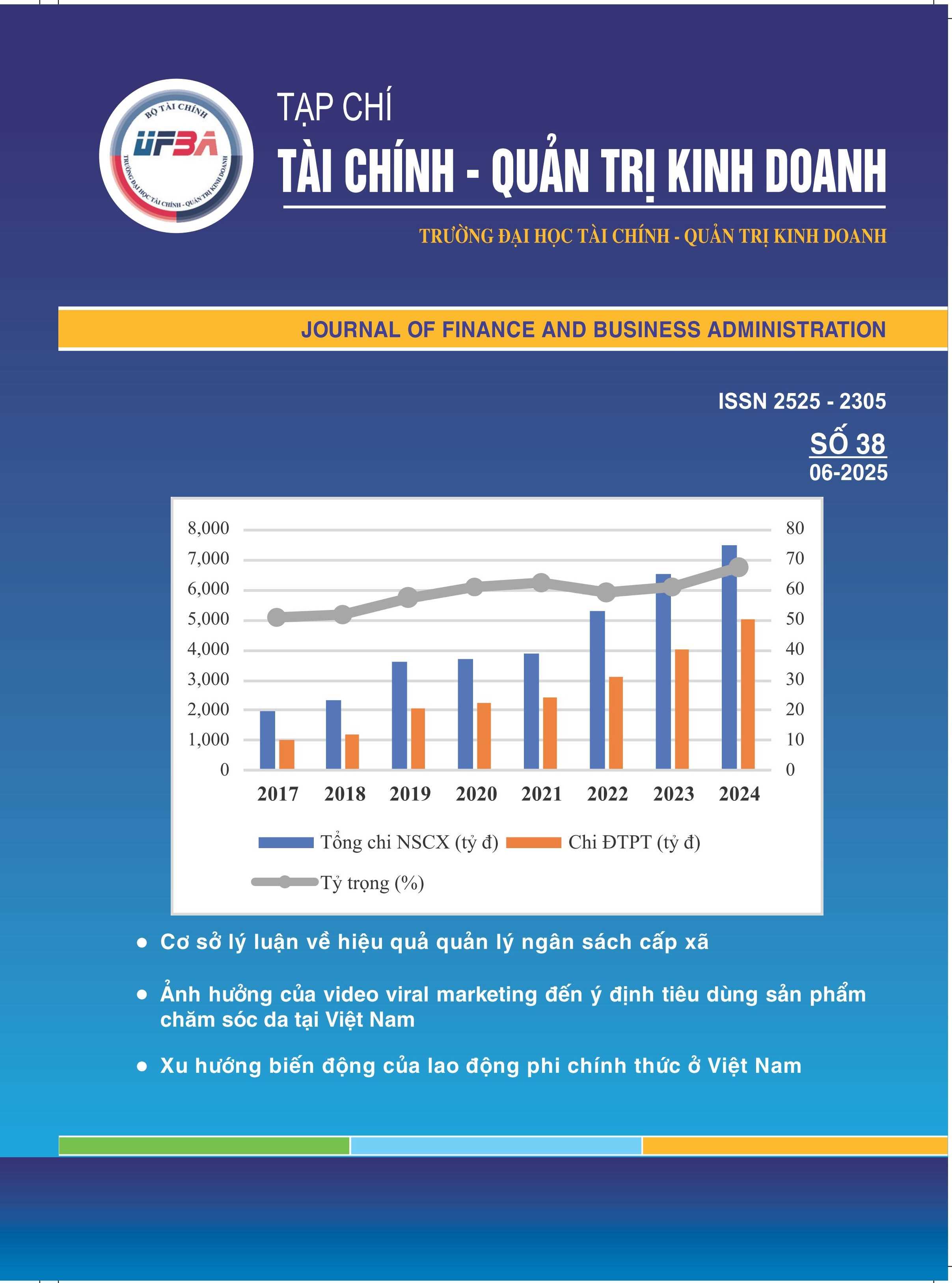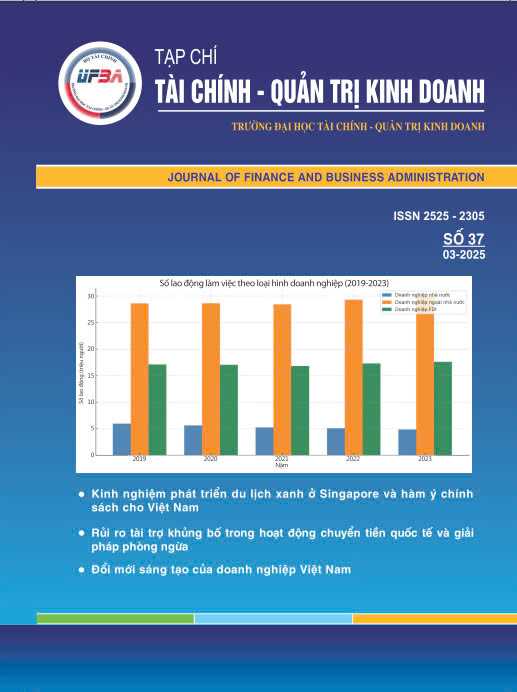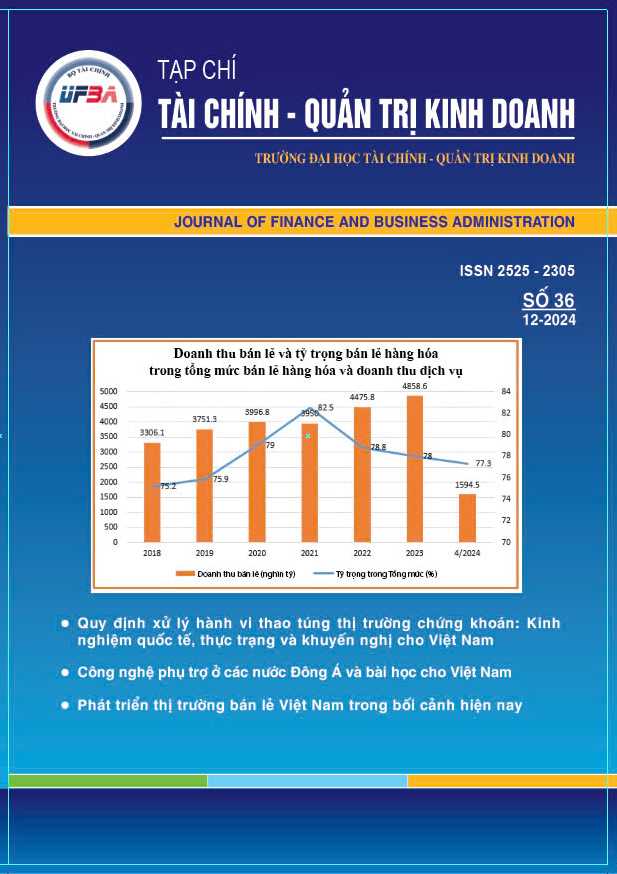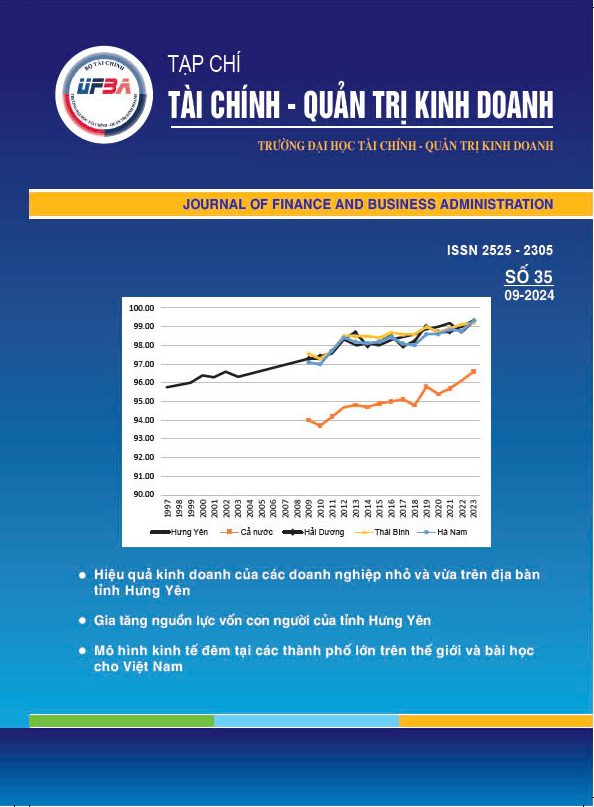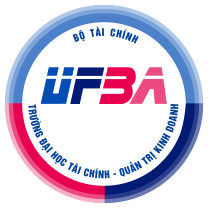JOURNAL OF FINANCE AND BUSINESS ADMINISTRATION, NUM 39.T09_2025
1. China’s dual circulation strategy: implications and policy lessons for Vietnam’s economy
Nguyen Trong Nghia, Do Minh Ngoc
In the context of turbulent globalization, since 2020, China has implemented the "Dual Circulation Strategy" (DCS) as a central policy directive. This strategy aims to concurrently boost the domestic market and maintain an active role in international trade and investment. The DCS is designed not only to strengthen China's internal economic resilience but also to generate ripple effects on the regional and global economies, including Vietnam. This analysis reveals that the Dual Circulation Strategy presents both opportunities and challenges for Vietnam. Vietnam can potentially leverage the trend of global supply chain shifts and expand its exports to the Chinese market; however, simultaneously, it must contend with escalating competitive pressure and the risk of increasing dependence on raw materials and technology imported from China. Given this evolving landscape, several key policy orientations are proposed for Vietnam to ensure independent, self-reliant, and sustainable economic development, including: actively capitalizing on the domestic market, restructuring supply chains, selectively attracting high-quality Foreign Direct Investment (FDI), fostering innovation coupled with human resource development, diversifying international economic partners, and linking economic growth with macroeconomic stability. These solutions will enable Vietnam to proactively adapt to the changes in the global economic structure induced by China's Dual Circulation Strategy.
2. Factors influencing the demand for human resource professionals in Vietnam
Nguyen Xuan Dien, Nguyen Thuy Linh
This study validates a model comprising five competency groups that influence the demand for human resources in HR in Vietnam, based on a survey of 300 valid responses in 2025. The results of Cronbach’s Alpha, EFA, CFA, regression, and SEM show that all competency groups have positive impacts, with professional competencies and relationship management competencies being the most significant. The research supplements empirical evidence for HR configuration theory and proposes recommendations for enterprises and educational institutions in the context of digital transformation.
3. Current situation and development orientation of Vietnamese real estate enterprises in the digital era
Nguyen Ngoc Quang, Pham Xuan Kien
This article evaluates the development status of Vietnamese real estate enterprises during the 2020–2024 period across several dimensions: investment capital scale, contribution to GDP, job creation, and infrastructure development. Based on these findings, it proposes appropriate development orientations in line with the context of global digital transformation, emphasizing the role of digital technology and digitalization in real estate business activities. The analysis is approached from both macro-policy and enterprise adaptation strategy perspectives, aiming toward the goals of sustainable, transparent, and efficient development in the future.
4. Research on factors affecting the quality of human resources of the state treasury of region IV
Trinh Thi Hong Thai, Tran Thi Hang, Le Thi Mai
The article focuses on analyzing factors affecting the quality of human resources (HR). Based on theory and research overview, the article builds a research model with 5 independent variables: recruitment, working environment, salary, benefits, training and job performance. The study uses a combination of qualitative and quantitative methods with 171 valid survey forms collected at the State Treasury (KBNN) region IV (including the KBNN Hung Yen merged with the KBNN of Ha Nam, Nam Dinh and Ninh Binh provinces, headquartered in Hung Yen according to Decision No. 385/QD-BTC dated February 26, 2025). The collected data was analyzed using SPSS 26 through the steps of reliability testing, EFA, and OLS linear regression. The results show that the working environment and benefits are the two factors that have the strongest impact on the quality of human resources, followed by training and job performance, salary and recruitment. On that basis, the article proposes a system of recommendations for each group of solutions to improve the quality of human resources at the regional Treasury.
5. Current state of green human resource management (GHRM) in the tourism industry in Vietnam
Nguyen Thi Thu Linh
In the context of Vietnam's tourism sector striving for sustainable development and climate change adaptation, Green Human Resource Management (GHRM) is increasingly regarded as a strategic tool to enhance workforce quality and promote green tourism. This paper aims to clarify the concept of GHRM, its key components, and its role in the tourism industry, while analyzing the current state of GHRM implementation in Vietnam. By comparing the policy frameworks and practical applications of GHRM in Thailand and South Korea, the study draws relevant lessons for Vietnam. The qualitative research approach is employed through the analysis of secondary documents, content analysis of prior studies, and comparative analysis of international policies. Findings reveal that while Vietnam has initiated some GHRM practices in selected localities and tourism businesses, the overall implementation remains fragmented, lacking systemic coordination and institutional support. Based on this, the paper proposes solutions such as establishing a national GHRM framework for tourism, enhancing green workforce training, fostering collaboration between government, enterprises, and training institutions, and strengthening monitoring and communication mechanisms. These efforts are expected to contribute to the realization of sustainable tourism development goals and improve the competitiveness of Vietnam’s tourism industry.
6. Factors influencing digital transformation in the accounting sector of people's credit funds: an empirical study in Hung Yen province
Cao Thi Hang, Trinh Thi Hong Thai
Digital transformation in the accounting sector has become an inevitable trend aimed at enhancing operational efficiency and financial transparency within financial institutions, particularly People's Credit Funds (PCFs). This study focuses on analyzing and evaluating the factors influencing digital transformation in the accounting field of PCFs located in Hung Yen Province. Employing a mixed-methods approach that combines both qualitative and quantitative analyses, the research is based on 196 valid survey responses, analyzed using SPSS 26 through reliability testing, Exploratory Factor Analysis (EFA), and Ordinary Least Squares (OLS) regression. The findings indicate that business environment pressure and technological infrastructure are the two most significant factors driving digital transformation in accounting, followed by corporate culture and the technological competency of accounting staff. Based on these results, the study proposes several practical recommendations and solutions to promote digital transformation in the accounting sector of PCFs.
7. Impact of ESG on valuation in Vietnam
Tran Dinh Thang, Nguyen Minh Nhat, Duong Thi Trang
The article addresses a new and topical issue in Vietnam, which is the integration of ESG into valuation activities. The authors have reviewed researches worldwide on the impact of environmental, social and governance factors on asset value as well as their impact on valuation activities. Applied in Vietnam, ESG can have a comprehensive impact on asset value as well as valuation approaches, requiring Vietnam to quickly research and integrate ESG into asset valuation activities. Some challenges are perfecting the legal framework on ESG, building a database, and improving the qualifications of valuers. The article also makes some recommendations for the State, valuation enterprises, and society to have appropriate recognition and assessment of the possibility of applying ESG into asset valuation activities.
8. Green logistics in Vietnam: opportunities and challenges
Nguyen Thi Thuy Linh, Truong Thi Tuyet Nhung, Nguyen Duc Thang
The article focuses on clarifying the opportunities and challenges in the process of developing green logistics in Vietnam. Opportunities in the process of developing green logistics include receiving the commitment of the Government and many supporting policies, increasing green consumption trends, increasingly developing technology and constant innovation. However, in addition to opportunities, green logistics also faces some challenges in the development process such as high investment costs, lack of awareness and specialized human resources, consumer behavior and old operating habits. From there, the article recommends some solutions in the coming time to take advantage of opportunities and limit challenges in the process of transitioning to green logistics in Vietnam.
9. Vietnamese labor force in the free economy: opportunities and challenges
Bui Van Bang
The Gig economy is thriving in Vietnam thanks to digital transformation and the explosion of digital platforms. This flexible employment model offers many opportunities for workers such as increased income, proactive time, and easy access to work. However, the workforce also faces major challenges such as instability, difficulty accessing social security, and inadequate legal protection. Based on data analysis from 2022 to 2024, the article proposes solutions such as perfecting the legal framework, expanding flexible insurance, training digital skills, and enhancing corporate social responsibility of platform businesses to develop a sustainable workforce in the digital economy.

